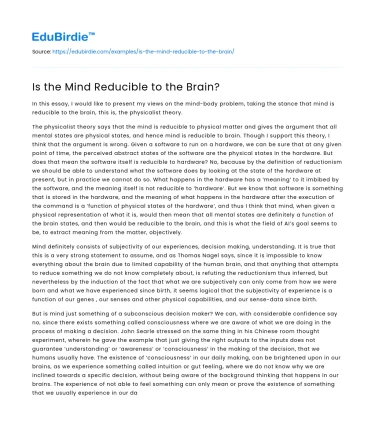In this essay, I would like to present my views on the mind-body problem, taking the stance that mind is reducible to the brain, this is, the physicalist theory.
The physicalist theory says that the mind is reducible to physical matter and gives the argument that all mental states are physical states, and hence mind is reducible to brain. Though I support this theory, I think that the argument is wrong. Given a software to run on a hardware, we can be sure that at any given point of time, the perceived abstract states of the software are the physical states in the hardware. But does that mean the software itself is reducible to hardware? No, because by the definition of reductionism we should be able to understand what the software does by looking at the state of the hardware at present, but in practice we cannot do so. What happens in the hardware has a ‘meaning’ to it imbibed by the software, and the meaning itself is not reducible to ‘hardware’. But we know that software is something that is stored in the hardware, and the meaning of what happens in the hardware after the execution of the command is a ‘function of physical states of the hardware’, and thus I think that mind, when given a physical representation of what it is, would then mean that all mental states are definitely a function of the brain states, and then would be reducible to the brain, and this is what the field of AI’s goal seems to be, to extract meaning from the matter, objectively.
Save your time!
We can take care of your essay
- Proper editing and formatting
- Free revision, title page, and bibliography
- Flexible prices and money-back guarantee
Mind definitely consists of subjectivity of our experiences, decision making, understanding. It is true that this is a very strong statement to assume, and as Thomas Nagel says, since it is impossible to know everything about the brain due to limited capability of the human brain, and that anything that attempts to reduce something we do not know completely about, is refuting the reductionism thus inferred, but nevertheless by the induction of the fact that what we are subjectively can only come from how we were born and what we have experienced since birth, it seems logical that the subjectivity of experience is a function of our genes , our senses and other physical capabilities, and our sense-data since birth.
But is mind just something of a subconscious decision maker? We can, with considerable confidence say no, since there exists something called consciousness where we are aware of what we are doing in the process of making a decision. John Searle stressed on the same thing in his Chinese room thought experiment, wherein he gave the example that just giving the right outputs to the inputs does not guarantee ‘understanding’ or ‘awareness’ or ‘consciousness’ in the making of the decision, that we humans usually have. The existence of ‘consciousness’ in our daily making, can be brightened upon in our brains, as we experience something called intuition or gut feeling, where we do not know why we are inclined towards a specific decision, without being aware of the background thinking that happens in our brains. The experience of not able to feel something can only mean or prove the existence of something that we usually experience in our daily lives, something we called ‘consciousness’ in English. Though the Chinese room experiment is right in its argument that giving right outputs to the corresponding inputs does not guarantee consciousness or understanding that is common place in our human brains, this conclusion does not refute strong AI, because it cannot be proven that understanding and consciousness cannot be achieved using a program. I would like to propose an inductive reason why ‘awareness’ and ‘understanding’ CAN be achieved using a program. The same argument of function of previous sense datum and hormonal systems. Every particular sense datum can be stored and every path taken during a decision using the algorithm can be stored in the (artificial) brain, giving rise to something I call ‘super human consciousness’, where in the machine will be aware and conscious of every single step done for the decision taken and its corresponding meaning and why.
You can see that every argument given here is a possibility for why mind could be reduced to the brain and not a perfect reduction. That is because due to our limited capabilities of the humans, there can and will always be stuff in the world our mind is completely unaware of or cannot comprehend completely, and we cannot perfectly reduce something that is not completely understood. So, I limit my argument to induction, since I believe new possibilities can be explored through induction rather than reduction.
I would like to conclude my essay by saying that though we can never really prove that mind is completely reducible to brain, there is enough inductive evidence and numerous ongoing scientific experiments to realize the same. And that artificial human or superhuman intelligence is definitely possible in the future






 Stuck on your essay?
Stuck on your essay?

